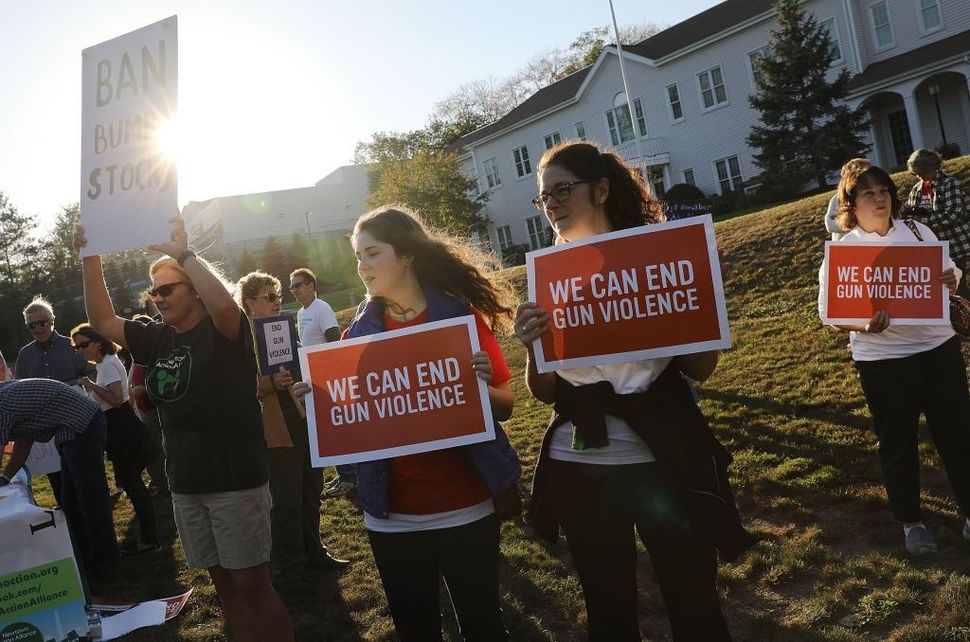Six Years After Newtown, We’re Making Important Progress To End Gun Violence

Dozens of people attend a vigil remembering the 58 people killed in Sunday’s shooting in Las Vegas and calling for action against guns on October 4, 2017 in Newtown, Connecticut. The vigil, organized by the Newtown Action Alliance, was held outside the National Shooting Sport Foundation and looked to draw attention to gun violence in America. Twenty school children were killed at the Sandy Hook Elementary School shooting in Newtown on December 14, 2012. Image by Getty Images
On Sundays, our synagogue holds a family prayer service. It’s nestled between two busy sessions of religious school. It’s a quick service — a little praying, a little singing, a few announcements and a whole lot of reflection.
At the close, we’re asked to share the name of someone who is sick or has passed away. We say the Mourner’s Kaddish. It’s an opportunity to mourn those loved ones we’ve lost — either recently or in years past.
This week, I mentioned the 20 children and 6 adults killed in the 2012 shooting at Sandy Hook Elementary School in Newtown, Connecticut. I couldn’t say all of their names in the time allotted. And I didn’t want to say the words “school shooting” at a service filled with so many young children. So I went with “the 26 from Connecticut.”
My 9-year-old wanted to know what I meant. But a moment later, he gave me a look of recognition and said he knew what I was talking about.
At the time of the shooting, I didn’t have any connection to Newtown. After the shooting, I got involved in the gun violence prevention movement because a friend of mine did so and I felt like I had to do something, too.
After six years as a volunteer, I’ve learned so much more about the ways guns have terrorized so many American families.
It turns out mass shootings are only part of the carnage. In the U.S., where more than 35,000 people die yearly from gun violence, nearly two-thirds of those deaths are from suicide.
I’ve met too many gun violence survivors to count.
They all have a story — and while individual narratives differ, there’s always overlap.
In every story, someone who should not have had access to a gun got a gun.
A few weeks ago, in my New Jersey suburb, a local mother was shot to death by her boyfriend.
It was not the first time that happened, either. In 2008, another local mom was also shot to death by her estranged boyfriend, in a local YMCA, in front of their daughter.
It’s remarkable how many people in this country have been impacted by gun violence.
From the get-go, I’ve said that if we are going to solve this problem — America’s gun violence epidemic — we were going to need a small army of fighters. The onus can’t be on the victims and their families.
I think America is finally starting to realize this.
Look at the midterm elections — so many new gun sense candidates won their elections, including Georgia’s Lucy McBath, whose son Jordan Davis was shot and killed six years ago for playing his music too loudly at a gas station. Now, McBath is headed to Congress.
So are Jason Crow in Colorado, Sharice Davids in Kansas, and Jennifer Wexton in Virginia — candidates who took a stand in the fight to end gun violence and won.
I’m not going to say that the anniversary doesn’t hurt. It stings terribly. And when I read about the children who were killed in their classrooms — Daniel, Avielle, Ben, Ana Grace, I still want to scream and cry at the same time.
But for the first time, in a long time, I think things may be starting to change.
Not because we say the Mourner’s Kaddish, but because we are using our voices to insist on change.
























